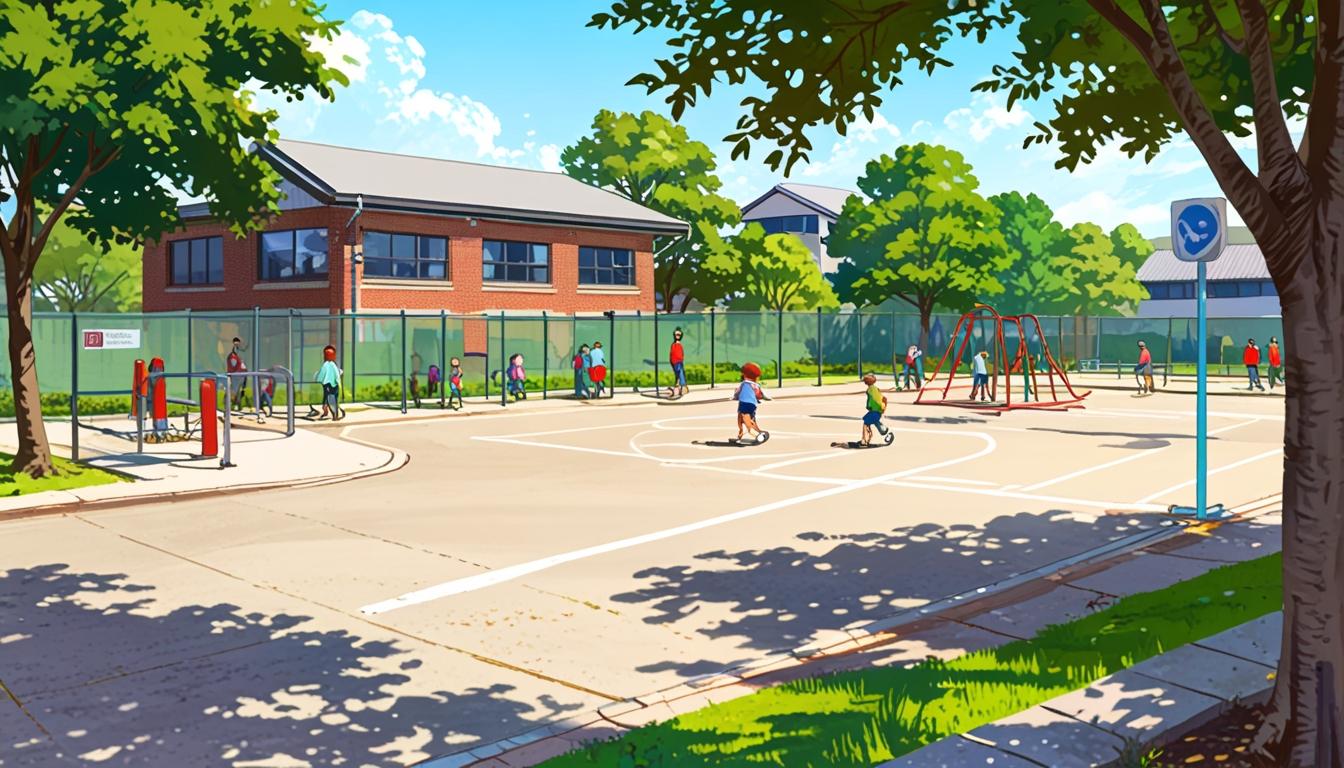Following safety issues and operational challenges, Thurrock Council has revoked the decision allowing parents to park in Woodside Academy’s playground. The new travel plan promotes off-site parking and sustainable transport, as the council explores broader solutions including ANPR enforcement and community-led parking policies.
Thurrock Council has reversed a controversial decision permitting parents to park in the playground of Woodside Academy in Grays, a move primarily driven by safety concerns and management difficulties. The issue surfaced after the council extended the school in 2013 to add six classrooms, which inadvertently intensified the parking challenges during peak drop-off and pick-up hours.
Initial efforts by the council to regulate this traffic included a condition imposed in 2015, aimed at managing the number of vehicles on-site to alleviate congestion on local roads. However, the school reported significant safety risks associated with vehicles manoeuvring in a space intended for children’s play. The absence of adequate supervision further compounded these issues, drawing numerous complaints from staff and parents alike.
At a recent planning committee meeting, school governor Fiona Gardner articulated the challenges faced, noting that the previous arrangements not only compromised safety but also disrupted the school’s daily operations, leading to considerable discontent among parents. “This arrangement has not proven to be a viable option,” she said. The school has since developed a comprehensive new travel plan that has received endorsement from Thurrock highways and planning authorities. “The playground area was not intended for vehicle use…this resulted in increased risk for staff and children at pick-up time,” Gardner emphasised.
The restructured plan introduces enhanced measures for managing parental parking off-site and aims to encourage sustainable transport options, including walking and cycling. Notably, the implementation of a “walking bus,” which currently serves approximately 50 pupils each day, reflects the community’s commitment to ensuring safer travel to and from school. The new strategy aims to reduce congestion and support the school day without compromising student safety.
The problem of school-related parking has broader implications within the borough. Earlier attempts by Thurrock Council to manage parking behaviour, such as a pilot scheme at Tilbury Pioneer Academy, ultimately faltered due to logistical challenges and insufficient fines. This indicates a deeper need for effective community engagement and a comprehensive approach to managing the traffic issues that plague schools throughout the area.
In response to these persistent challenges, Independent Councillor Neil Speight proposed the introduction of Automatic Number Plate Recognition (ANPR) cameras to enforce parking regulations near schools. Given the escalating congestion during school hours and a lack of parking enforcement officers, this proposal seeks to deter illegal parking and ensure compliance with local regulations.
Moreover, an initiative called the Parking at Schools Task and Finish Group has been established by Thurrock’s Place Overview and Scrutiny Committee to gather resident feedback and develop a new Parking at Schools Policy. Set to conclude with recommendations in November 2024, this project represents a concerted effort to address school parking issues through community collaboration.
As Thurrock navigating its educational infrastructure challenges, including the announcement of a new secondary school to address capacity issues, these parking strategies will be crucial. While the council has pledged to monitor traffic and implement mitigative measures, the necessity of finding effective, community-supported solutions to parking problems remains paramount.
The reversal of the parking allowance at Woodside Academy underscores a growing recognition of the need for careful management of school environments, where the safety and well-being of students must remain the top priority in the face of logistical challenges.
Reference Map
- Paragraph 1, 2, 3, 4
- Paragraph 5
- Paragraph 6
- Paragraph 7
- Paragraph 8
- Paragraph 9
- Paragraph 10
Source: Noah Wire Services
- https://www.yellowad.co.uk/school-playground-parking-plan-overturned/?utm_source=rss&utm_medium=rss&utm_campaign=school-playground-parking-plan-overturned – Please view link – unable to able to access data
- https://www.bbc.co.uk/news/uk-england-essex-38017410 – In 2015, Thurrock Council initiated a £5,000 trial at Tilbury Pioneer Academy, allowing teachers and parents to issue parking tickets outside the school. However, the scheme was halted after three months due to a lack of fines issued and challenges in training volunteers. The council acknowledged improvements in parking behavior but found the project difficult to continue. Critics argued that proper engagement with parents was necessary for effectiveness.
- https://www.bbc.co.uk/news/articles/cy84mxg81ero – In September 2024, Independent Councillor Neil Speight proposed using Automatic Number Plate Recognition (ANPR) cameras to enforce parking regulations outside Thurrock schools. He highlighted the overwhelming number of cars during drop-off and pick-up times and the shortage of parking wardens. The proposal aimed to deter illegal parking by imposing fines on rule-breaking parents, addressing the challenges posed by insufficient enforcement resources.
- https://thurrock.nub.news/news/local-news/residents-asked-to-help-compile-survey-of-school-parking-problems-across-borough-240825 – In September 2024, Thurrock Council’s Place Overview and Scrutiny Committee commissioned a ‘Parking at Schools Task and Finish Group’ to review parking issues outside schools. To gather resident feedback, a survey was created, inviting comments on parking problems. The information collected aimed to inform recommendations for a new Parking at Schools Policy, with responses analyzed and shared with the Task and Finish Group in November 2024.
- https://thurrock.nub.news/news/local-news/councillors-pledge-to-tackle-school-parking-issues-235387 – In July 2024, Thurrock councillors agreed to establish a group to address illegal parking outside schools. The ten-week project, starting in September, involved input from councillors, schools, parents, and children. The group’s findings were to be reported back to the committee, with a focus on exploring innovative solutions to the persistent problem of nuisance parking by parents outside the borough’s schools.
- https://consult.thurrock.gov.uk/parking-at-schools-resident-s-survey – Thurrock Council’s Place Overview and Scrutiny Committee commissioned a ‘Parking at Schools Task and Finish Group’ to review parking issues outside schools. A survey was created to gather resident feedback on parking problems, aiming to inform recommendations for a new Parking at Schools Policy. Residents were encouraged to complete the online survey by October 13, 2024, with paper copies available in libraries and community hubs across Thurrock.
- https://thurrock.nub.news/news/local-news/despite-concerns-over-parking-and-drop-off-22-million-new-secondary-school-is-approved-because-39time-is-of-the-essence39-as-borough-school-places-crisis-continues – In March 2021, Thurrock Council approved plans for a new £22 million secondary school between Chadwell St Mary and Grays, despite concerns about traffic and parking. Councillors raised issues about the school’s location in the green belt and potential traffic problems. However, the urgent need for new school places in the borough led to approval, with expectations for future traffic monitoring and mitigation measures.
Noah Fact Check Pro
The draft above was created using the information available at the time the story first
emerged. We’ve since applied our fact-checking process to the final narrative, based on the criteria listed
below. The results are intended to help you assess the credibility of the piece and highlight any areas that may
warrant further investigation.
Freshness check
Score:
8
Notes:
The narrative appears to be recent and relevant, as it discusses ongoing issues and recent decisions by Thurrock Council. However, specific dates for the planning committee meeting are not provided.
Quotes check
Score:
9
Notes:
The quote from Fiona Gardner appears to be original and not widely available online, which could indicate it is the first use of the quote. The original source is not verified further than the narrative.
Source reliability
Score:
6
Notes:
The narrative originates from a less well-known publication, which may not have the same level of fact-checking rigor as major news outlets.
Plausability check
Score:
9
Notes:
The claims about school parking issues and the reversal of the parking plan are plausible, given the context of safety concerns and logistical challenges.
Overall assessment
Verdict (FAIL, OPEN, PASS): PASS
Confidence (LOW, MEDIUM, HIGH): MEDIUM
Summary:
The narrative is likely to be accurate due to its plausible claims and what appears to be original quotes. However, the reliability of the source is moderate due to it being from a less prominent publication.













